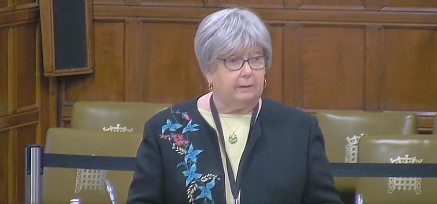
On November 23rd, after being delayed by the prorogation of Parliament for the King’s Speech, Westminster finally debated the ever-increasing need for an energy social tariff. The debate provided the opportunity for the concerns of many disabled organisations who for months have been stressing to me the real concerns of their members about energy bills.
As we enter the winter months, lots of us are eagerly looking forward to the festive period. But for many, the winter months and colder weather are a time of genuine worry, stress and anxiety. This is the case for many vulnerable people, particularly low-income and disabled households who are once again greatly concerned about high energy bills this winter. This is certainly what is being relayed to me by my constituents and of all the Disabled organisations I regularly meet with.
November’s Autumn Statement did not do anything to address the concerns of low-income, vulnerable and disabled households with their energy bills this winter. Alongside this, Ofgem’s recent announcement means that households will start paying higher prices for their energy as they enter 2024. The new price cap is a £94 increase from the current rate. This will only add to the worries of millions up and down the country.
But during the Autumn Statement one year ago this very same Government committed to “developing a new approach to consumer protection in energy markets by working with consumer groups and industry to consider the best approach, including options such as social tariffs.” This commitment has been repeated multiple times since, including by the Prime Minister and others.
In April, the Department for Energy Security and Net Zero reiterated this pledge by promising to consult on an energy social tariff in the summer of 2023. Despite the multiple commitments, a consultation has never materialised and as we enter winter, there is a significant risk that no new protections will be in place by April 2024. All the while, the very real anxieties of low-income and disabled households over their ability to heat their homes this winter have risen exponentially.
What is an energy social tariff? An energy social tariff refers to a system of targeted support through a reduction of energy bills for vulnerable, low-income and disabled households in response to incredibly high energy bills. The need for a social tariff cannot be stressed enough, as 1 in 3 households will spend more on energy bills this winter than last and the figure is closer to half for the poorest households. Citizens Advice Bureau research shows that energy bills are 61% higher than their 2021 levels.
The impact that rising costs have in the lives of disabled and low-income households is huge. According to Scope, the average monthly cost for a disabled household is a staggering £975 extra per month. According to Mencap, half of all low-income disabled households are in arrears with at least one household bill since winter 2022. The impact is not just financial, the rationing of energy for those with Disabilities can have a devastating impact on their health. 31% of those surveyed by Scope said going without heating would severely impact their health. 9% said it would put their life at risk.
Do we expect people to fall deeper into debt to protect their health? Or do we simply expect people to let their condition deteriorate and worsen?
A social tariff is affordable. Recent reports show that there is significant headroom in Government finances and the Prime Minister and Secretary of State have said that the Government’s new round of Oil and Gas licensing would raise money to reduce bills. A social tariff would have numerous economic benefits that would also offset the costs. For example, illnesses brought on by a cold and damp home cost the NHS between £500m and £1.4 billion per year. Energy debt is also dramatically reducing the spending power of households who can no longer spend money.
While I was disappointed that the Government made no commitment to hold consultations, I remain steadfast in raising the concerns and needs of the disabled community. The disabled and the most vulnerable need more support and this Government must listen to them.
